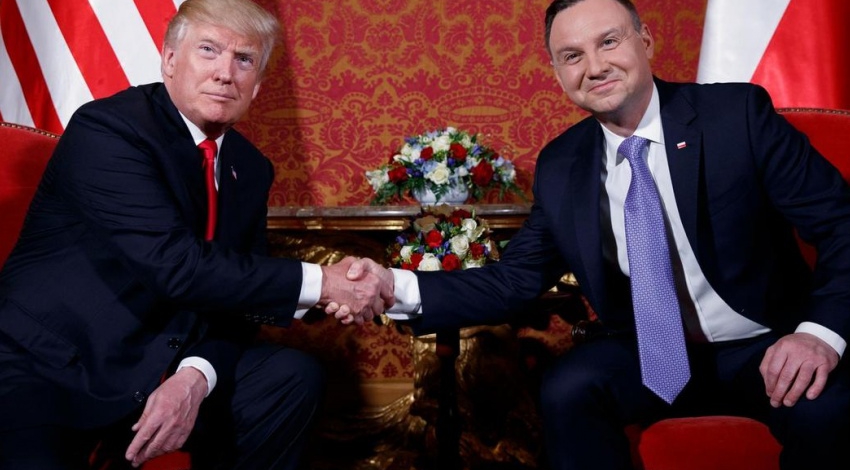Previously, Duda had claimed to be wearing the hat of "mediator" between Washington and Europe, which is wary of Trump's anti-EU stance, and now he has fully dispensed with that pretension by fully joining the US camp in an important foreign policy matter affecting Europe's security and sovereignty.� No doubt, this will not endear Duda to the European power houses -- France, Germany, England -- that have sought to put forth a united front on the Iran question ever since Trump exited the nuclear deal.� The EU politicians are not blind and clearly see a cunning Washington policy of 'divide and conquer' by trying to sow division between Central and East European countries on the one hand and Western Europe on the other.
Washington's intention of this conference is, of course, to reverse its diplomatic isolation in the international community as a result of its rogue behavior in unilaterally scuttling an international nuclear agreement, hoping to demonstrate the popularity of its anti-Iran approach and, simultaneously, apply added pressure on the EU to give up its independent course of action on Iran.� With Britain consumed by the Brexit drama, Germany experiencing a leadership transition, and Macron's France grappling with domestic unrest, the stage is set for a new US diplomatic offensive that seeks to reassert American hegemony over Europe, which has made a feeble heroic effort to chart its own map of action on Iran and the Middle East yet falling dreadfully short due to a variety of internal and external factors, including the stern opposition by US and Israel.
Thus, the Trump administration through this conference is escalating the tension with Iran to a higher gear, by seeking to 'globalize' its anti-Iran crusade and to create an international united front against the "Iran threat" that would, in turn, facilitate the parallel effort at the regional level in Persian Gulf and the Middle East.� Connecting the dots between the regional and the global, the Trump administration, which has failed to gain any traction for its Iran policy at the United Nations, is now essentially bypassing the UN and hoping to create a new "coalition of the willing" against Iran, reminiscent of the Iraq invasion of 2003.
As a result, some Western analysts have raised the alarm that we are witnessing a new Iraq war in slow motion, in light of the economic war waged against Iran by US government, as a prelude for a full-scale open confrontation after having weakened Iran's economy and Iran's will to resist.� This is a�familiar script, though with some significant differences that cast important question marks on the wisdom of this policy.� Indeed, the pitfalls of the US strategy are quite numerous and present formidable challenges to US uber hawks plotting war with Iran.
First, there is no consensus on Iran and even the Israeli and Saudi threat perceptions don't exactly match.� The Saudis have raised Israel's concern with their extensive plans for nuclear power, and the Saudis cannot risk their legitimacy by moving too close to Israel, which continues to oppress the Palestinians.� Certainly, in the Muslim Middle East today there is a great deal of apprehension about the lop-sided pro-Israel policy of Trump administration and the prominent role played by ardent Zionist Jarred Kushner, Trump's son-in-law.� A balanced Middle East policy by this administration is conspicuously missing, otherwise it would have launched an international conference on the (missing) Middle East peace process, instead of Iran, which is used as a scapegoat.
Second, Poland is slated as the home for US's sophisticated radar and air defense system in the post-INF environment, thus exacerbating the Polish-Russia tensions, which is why the Iran conference must be viewed in tandem with US's Russia policy that is also questioned by European leaders, who oppose US's withdrawal from INF Treaty and the acceleration of nuclear arms race as a result of it.� Acting as the spear of US's policy in Europe will only add to Warsaw's headaches with other European governments as well as with Russia at exorbitant price for Poland's national security.� Hence, the Polish government ought to ask itself if this is worth it and makes any sense at all from the prism of Poland' national interests?
Third,�Duda is throwing�his lots with a US president who is under growing investigation and faces mounting political problems as a result of new revelations concerning FBI investigation of Trump as a potential Russian asset.� The majority democrats in US House of Representatives are also asserting themselves and working to slow Trump's march to another war, which may happen if countries like Poland lend their souls to this hawkish and reactionary administration that has upended international norms.� Trump may manufacture a foreign war in order to salvage his presidency by whipping up jingoism and mobilizing the nation against a foreign threat. Increasingly under siege at home, the second half of Trump's presidency may indeed turn out to be disastrous for international peace and security, as well as world economy since a Persian Gulf conflict is sure to spike oil prices and hurt global economic recovery.
In that case, any US-derived benefit to Poland for its new subservient role in hosting the said conference and assisting the White House's 'war party' would prove elusive and trumped by the negative economic fallout of Trump's bellicose posture vis-�-vis Iran.�� A small step in arresting the world's evolution toward a post-Cold War multipolar reality, the conference initiative is laden with symbolic significance outweighing its actual importance.� Iran threat is the excuse by which US is seeking to re-wind the clock back to unipolarism, which cannot possibly be successful as long as other centers of global power including Europe sing a different tune.� The American leitmotif is transparent, yet the net result of the Polish-orchestrated symphony against Iran is far less clear and laden in ambiguity.
# Tags











